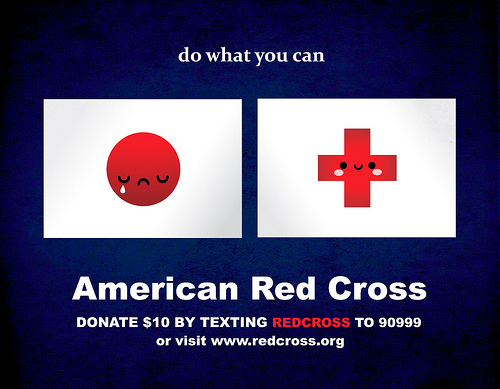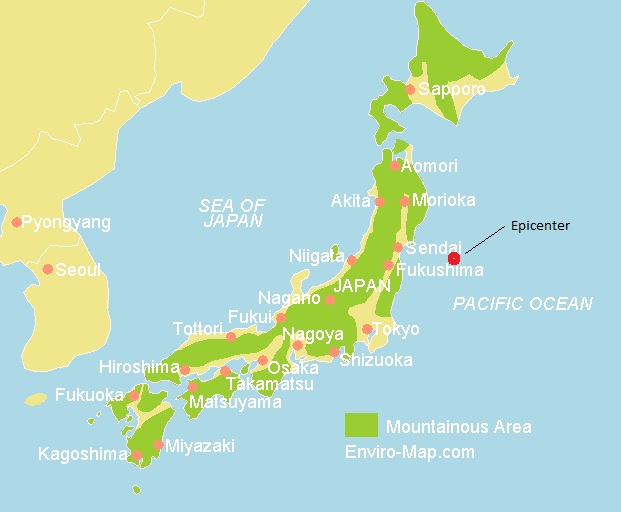 Oct. 29, 2012 Update: Nice reminder on talking tips to quell anxiety about Hurricane Sandy, from the Child Mind Institute.
Oct. 29, 2012 Update: Nice reminder on talking tips to quell anxiety about Hurricane Sandy, from the Child Mind Institute.
Mar. 14, 2011 When I was a child living in Japan through the 8.0 Tokachi-oki earthquake, I remember coming out of hiding to find my pet goldfish had vanished (found across the room under my dollbed weeks later, having sloshed out of the bowl from the impact) —at the time, I was convinced that the critter ‘magically disappeared’ because ‘it was just too scared.’
Today, having just returned from tsunami warnings in Mexico due to the 8.9 Japanese quake tragedy, the hands of time cycle back to my youth and the innocent mind’s eye interpretation of “unbelievable” stories that were clearly a coping skill for resiliency….Fantasy played a huge role in transporting favorable conditions in otherwise dire situations (especially living overseas as a tyke during the Vietnam War and the uncertainties of dear ol’ dad’s whereabouts therein). So this made me ask myself…
How ARE kids coping skills these days amidst surround sound reality, blaring in ambient media? Being informed, empathetic, and proactive with this list of teaching tools and lesson plans addressing the images coming out of Japan with media literacy is fabulous (NYT Learning Network blog) …However, just as I wrote about terrorism post-9-11 media saturation and also during the Virginia Tech rampage, there comes a time when common sense and age-appropriate filters need to gauge over-exposure to the insta-loop replays and daily deluge of graphic videos of wailing loss, floating cars and crying kids.
What do children think and feel when seeing homes smashed to kindling and cars bobbing about like bathtub boats? When do you shut it off and walk away? Or did they ever see the media at all? Where’s the line between bubble wrapping and triggering insecurities?
I’m not talking about new studies of parents coddling kids at a scary movie making it worse, I’m talking about the kind of trauma stemming from uncertainty of natural disasters, nightmares of anxiety and terror in the form of psychological and physiological contexts…
Here are a few reminders from my prior posts on coping with media onslaughts and some key questions I keep in my own mental relay every time I see ‘before/after’ satellite photos of wiped out towns that often show the region rather than a direct replication of the map print area but painfully surreal reminding to continue to ‘compare apples with apples’ as well as to ‘keep calm, carry on’…
Be extra sensitive to wide-eyed, anxious tots who may not have been ‘exposed’ to media directly but perhaps even picked it up from playground re-enactments and peer to peer fantasy play to work through and make sense of their environments.
 No stranger to earthquakes, typhoons, and tsunami warnings myself, I’ve grown to have a certain sort of fatalistic calm about calamities in general and certainly media’s sensationalized presentation and continuous depiction of same. (always the water nymph, I’ve lived on islands a looooong time, from Hawaii, Japan, and my current funky island in the SF Bay Area where I got hammered in the ’89 Loma Prieta quake being smack dab on the San Andreas fault line)
No stranger to earthquakes, typhoons, and tsunami warnings myself, I’ve grown to have a certain sort of fatalistic calm about calamities in general and certainly media’s sensationalized presentation and continuous depiction of same. (always the water nymph, I’ve lived on islands a looooong time, from Hawaii, Japan, and my current funky island in the SF Bay Area where I got hammered in the ’89 Loma Prieta quake being smack dab on the San Andreas fault line)
But kids? They need their safety zone. Amidst developing brains and impressionable minds, security blankets extend to media messaging…
There’s a ‘can’t look away’ rubbernecker curiosity that captivates even when media is horrific (maybe this also explains the mass appeal of reality TV shows with the Snooki set?) …but as Jenn Pozner writes in Reality Bites Back, there’s a price to be paid for ignoring the warning tremors and toll it takes on the human condition…whether that’s ‘RealityTV’ or reality headline news.
In sum, pay attention to gut instincts, use media literacy to help make sense of it all, and get to high ground BEFORE overwhelm, fright factor, or uneasiness starts to hit, not AFTER cumulative despair and sadness whacks you upside the head like a rogue wave.
When in doubt, tune it out.
Here are a few key reminders to kick off visual and media literacy discussions and ease kids’ concerns from colleague Frank Baker’s fabulous Media Literacy Clearinghouse (chock full of easy to use resources for ANYone who works with kids)
Helping Students Deal with Images and News from Japan
1. What did you hear, see, or read about the disasters?
2. Did you understand what you heard, read or saw?
3. Are news people using words/phrases you might not understand?
4. Do you know the source of the news, image or other information?
5. What sources do you currently use to determine what is happening in Japan?
6. How reliable are your sources?
7. Are there other reliable sources? For example, are all of your sources US based; or are you reading sources from Asia, Europe, etc.?
8. How might international sources differ in style and tone from the US?
9. Why might it be important to “turn off” the news?
Related-Media Lit by Amy Jussel, Shaping Youth
The 411 on 9-11: What To Say to Kids About Headline News
Resource Roundup/Talking To Kids (Terrorism topics etc)
Virginia Tech Tragedy: Media Coping Tips
What Will Kids Learn About Dr. George Tiller…And From Who?
Role Modeling Resiliency: How Are Kids Coping Skills?
Mass Media Has A Role to Play in Curbing Violence (news)
SchoolLoop: Digital Voice Alert (Siren SoundOff: Media Call)
Media, Kids & Grief: Different Ages & Stages of Loss
Classroom Curriculum & Exercises: Media Lit/News:
Create Your Own Media Headline (How media is made/interactive)
Teach Kids News (Grades 2-6)
Rebooting The News (great links/roundup of SLJ edu tools too!)
The News Literacy Project (How to Know What to Believe–digital lit)
MIT/Reconstructing: A classroom exercise; reflections on humanity and media after tragedy (deconstructing media w/analysis of sound/news footage, etc.)
Talking With Kids About Tough Subjects (Before everyone else does)
World Affairs Council: Global classroom, 31pp curriculum in pdf: Teaching Media Literacy Through the Topic of Terrorism (middle/high school)
American Red Cross/Facing Fear: Free Downloadable Curriculum for K-12
PBS Teachers: Media Literacy Sites & Programs Great list of links, shows, topics, guides and more
Media Literacy Clearinghouse Frank Baker has links out the wazoo on multiple areas of specialization as well as allied orgs (see our blogroll sidebar)
How to Talk to Your Child About the News Simple overview/KidsHealth primer
Kids Health: Primer/How Kids Perceive the News
Media Literacy 101: How to Detect Fear-Mongering
Watching TV News: How to Be A Smarter Viewer
Visual Credits: Lead graphic, Flickr Stream ‘asked to share’ by Jerrod Maruyama Scared kid Flickr uaeincredible via MNN.com, Map of Japan, Enviro-Map








We are publishing daily kid-appropriate and kid-friendly news articles about topics, including the Japan crisis. They are designed to help kids through the morasse of current events in a way that does not shock or scare. I’d encourage anyone with kids to check them out at http://www.teachkidsnews.com.
Thanks, Joyce, pleasure to virtually meet you as a fellow former journo/edu gal! (just checked out your ‘about us’ section on TKN)
I’ve added your link to our resources above and will tweet it out as an item in a sec. Canadians seem to have awesome media literacy resources…(Media Awareness Network, etc) who are some of your faves in this arena?
Who am I missing here? I’d be glad to add them to the post as I think our biggest value to journo/edu folks (parents/youth too!) is ‘one stop hub’ of resources with critical thinking skills taking the stage.
Hi Amy, I found this article from Michelle Borba on Twitter. I really enjoyed reading your article and agree that it is so important that we teach children how to understand and handle their feelings surrounding events like the earthquake/tsunami in Japan. I also work with parents and teachers and have written an article with some of my suggestions for talking to children about Japan.
http://www.sanditeaches.com/2011/03/japan/
I hope it’s ok to share that link here! I look forward to staying in touch, I’ve just added you on my Twitter (@SandiSchwartz)
Big Hugs,
Sandi